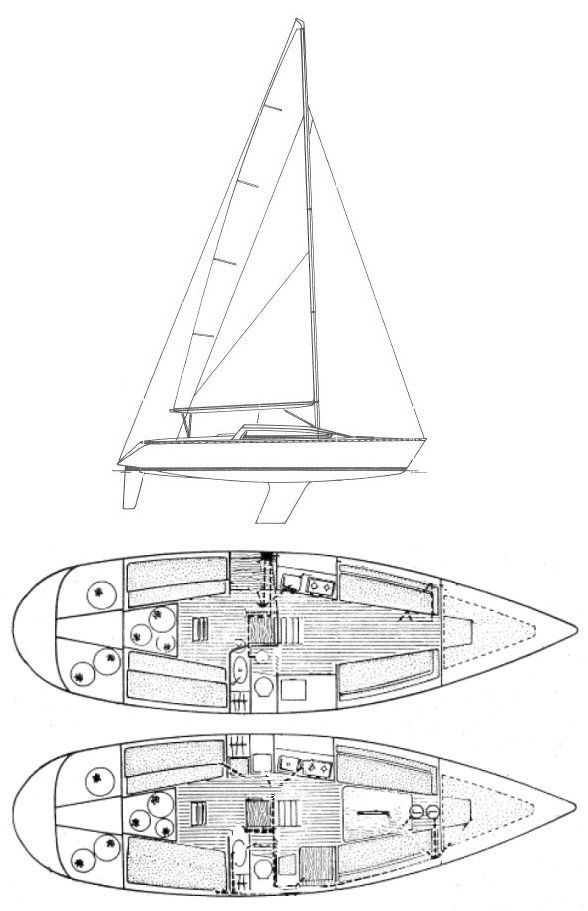The Jeanneau Selection 37, built by the renowned French shipyard Jeanneau between 1984 and 1991, is a distinctive racer-cruiser designed by the acclaimed naval architects Joubert & Nivelt. Conceived primarily for the demanding "Tour de France à la Voile," an annual yachting race around the French coast, this model strikes a balance between spirited performance and adaptable interior comfort. The Selection 37 earned a reputation as a sporty and fast sailboat, capable of both competitive club racing and enjoyable family cruising.
Selection 37 (Jeanneau) Information, Review, Specs

- Make
- Jeanneau
- Model
- Selection 37
- Number Built
- 251
- Production Year(s)
- 1984 - 1991
The creation of the Jeanneau Selection 37 emerged from a specific competitive purpose: its design was notably geared towards the "Tour de France à la Voile" race, which took place annually between 1984 and 1991. This race-focused brief shaped the boat's inherent performance characteristics, making it a one-design vessel suitable for high-level competition. During the Selection 37's production period, Jeanneau, under the ownership of United States-based Bangor Punta for a significant portion, continued its commitment to adopting new technologies and innovative design. The company had been an early adopter of fiberglass construction, launching its first full-production fiberglass boat in 1960 and firmly establishing its sailboat manufacturing prowess with the popular Sangria in 1970. For the Selection 37, designers Joubert & Nivelt crafted a hull of GRP (fiberglass) and equipped it with a fractional sloop rig, known for its control and adjustment capabilities due to well-thought-out deck fittings and a generous sail area. While primarily a performance platform, Jeanneau also offered an "owner's version" of the Selection 37, indicating variations in the interior layout to cater to cruising enthusiasts.
Sailing Performance and Handling
The Jeanneau Selection 37's design ratios underscore its performance-oriented nature. With a Sail Area to Displacement (SA/D) ratio of approximately 20.36, the boat demonstrates an impressive sail plan relative to its weight, suggesting excellent performance in light winds and an eagerness to accelerate. Its Displacement to Length (D/L) ratio of around 176.6 indicates a relatively light displacement for its length, further contributing to its lively performance. While its Ballast to Displacement (B/D) ratio of roughly 0.242 is on the lower side, potentially indicating less initial stiffness compared to heavily ballasted cruisers, owners have reported feeling safe even with this ratio, which is common in performance-focused designs.
Anecdotal accounts and builder descriptions frequently praise the Selection 37's agility and speed. Owners have reported impressive speeds, with some achieving sprints up to 13 knots, and consistently describe the boat as "very easy to handle". Its fin keel, combined with a spade rudder, contributes to its "splendid manoeuvrability". The fractional sloop rig, often equipped with running backstays, highlights its sporty character and responsiveness, making it a capable vessel for those who appreciate precise control and spirited sailing.
Accommodations and Layout
While detailed interior specifications for the Jeanneau Selection 37 are not extensively documented, the boat was produced in different configurations to suit its dual purpose. The specialized "Royale Tour de France à la Voile" version featured a more spartan, race-focused layout with four bunk berths, prioritizing crew capacity and weight distribution over creature comforts. In contrast, the "Owner's version" of the Selection 37 offered a more traditional and comfortable interior designed for cruising. This version typically included a more developed cabin layout, often featuring a central saloon table, and has been noted for providing "great accommodation," with some configurations offering up to eight berths through a combination of cabins and convertible salon settees. Jeanneau's general design philosophy of creating "liveable boats" with "clever layouts and comfortable amenities" would have guided the owner's version, aiming for a balance of practicality and comfort suitable for extended cruising.
Measurements
Construction & Hull
- Construction Material
- Fiberglass (Solid)
- Hull Type
- Monohull Sailboat
- Keel Type
- Fin
- Rudder
- 1x Spade
- Ballast
- 2422 lbs
- Displacement
- 9980 lbs
- Water Capacity
- 14 gal
- Fuel Capacity
- 10 gal
Engine
- Engine Make
- Yanmar
- Engine Model
- —
- Engine Type
- —
- Engine HP
- 18
- Engine Count
- 1
- Drive Type
- —
- Fuel Type
- Diesel
Rig & Sails
- Rig Type
- Fractional Sloop
- P (Main Luff)
- 43.47 ft
- E (Main Foot)
- 16.4 ft
- I (Foretriangle Height)
- 38.92 ft
- J (Foretriangle Base)
- 12.1 ft
- Forestay Length (est)
- 40.76 ft
- Main Sail Area
- 356.45 sqft
- Foretriangle Sail Area
- 235.47 sqft
- Total Sail Area (Reported)
- 592 sqft
- Total Sail Area (Calc)
- 591.92 sqft
Dimensions
- LOA
- 37.24 ft
- LWL
- 29.33 ft
- Beam
- 10.67 ft
- Draft
- 6.25 ft
- Max Headroom
- -
- Air Draft
- -
Calculations
- Hull Speed
- 7.26 kn
- Pounds per Inch Immersion
- 1